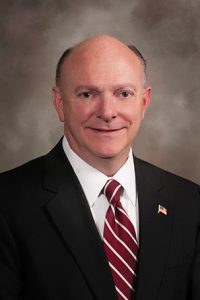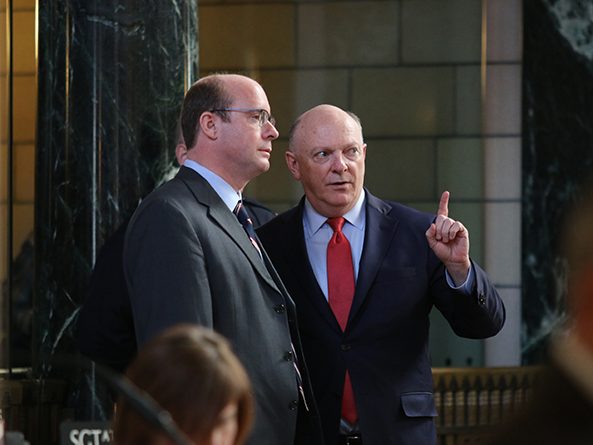State personal exemption credit, standard deduction advanced
Senators advanced a bill March 8 intended to prevent a rise in taxes on Nebraskans as a result of recent changes to federal tax law.
Congress made several changes to the federal tax code in December with the Tax Cuts and Jobs Act. Papillion Sen. Jim Smith, sponsor of LB1090, said that because Nebraska’s tax law is tied to the federal code in several places, automatic changes to the state’s tax code would generate more than $220 million in additional state revenue this year.
“LB1090 is an attempt to hold as many Nebraskans harmless as possible and prevent large tax increases due to what happened at the federal level,” he said.
One major change is the repeal of the federal personal exemption. The change would effectively repeal Nebraska’s personal exemption credit, which is tied to the federal exemption. To offset this change, LB1090 would create a new $134 state personal exemption credit that individuals could claim for themselves and each of their dependents beginning in 2018.
Congress also made changes to itemized deductions, exemptions for capital expenditures and the federal standard deduction. To offset those changes, Smith said, LB1090 would establish a Nebraska standard deduction of $6,750 for single taxpayers, $9,900 for head of household filers and $13,000 for those who are married filing jointly.
The bill also would adjust individual income tax brackets, the personal exemption credit and the standard deduction based on the Consumer Price Index for All Urban Consumers instead of the new federal indexing method.
The state Department of Revenue estimates that the bill would reduce state tax revenue by $326 million in fiscal year 2018-19 and a further $257 million in FY2019-20.
Sen. Merv Riepe of Ralston spoke in support of the bill. If the Legislature does not act, he said, Nebraska families and businesses will not enjoy the full impact of the federal tax cuts, and the state’s economy would not grow as it otherwise would have.
“Federal tax reform is not intended to be a windfall for the Legislature, and it is not a tool to help this body avoid difficult spending decisions,” he said. “These dollars are not revenue for spending and belong to the hardworking men and women of Nebraska.”
Omaha Sen. Bob Krist introduced an amendment that would create a similar state-level personal exemption credit but would limit eligibility to those earning no more than $100,000 if filing as an individual and no more than $200,000 if married filing jointly. It also would use some of the additional revenue due to the federal changes to make a one-time payment of $20 million to the state’s property tax credit fund.
Krist said the proposal—which is based on Omaha Sen. Burke Harr’s LB1048—would ensure that low- and middle-income Nebraskans are held harmless while giving the state a cushion if the state Department of Revenue erred when estimating the federal changes’ impact.
“I want to make sure that we in the long term do not create a bigger hole in our general fund by overreacting and not allowing the federal tax changes to come to fruition so that we can evaluate how much money we do and do not have available,” he said.
Sen. Kate Bolz of Lincoln supported the amendment. She agreed that the Legislature should adjust to the federal tax code changes to avoid tax increases on Nebraskans, particularly low- and middle-income Nebraskans.
“But I also think it’s our responsibility to make sure that the tax policy changes we’re making don’t have inappropriate effects on our long-term ability to budget,” she said.
Smith opposed the amendment, saying that it effectively would raise taxes on the state’s highest earners by $66 million this year.
“[LB]1090 keeps everyone whole,” he said. “[Krist’s amendment] does not further benefit low- and middle-income tax earners more than LB1090.”
Columbus Sen. Paul Schumacher also opposed the amendment. He said Smith’s proposal is not perfect but is intended to be a “quick and fair fix” to offset the federal tax changes. Limiting the personal exemption credit to those at certain income levels would be more complex than is necessary, he said, and the effects of the federal changes on those earning more than $100,000 are unclear.
“My suggestion … would be at this point to do what is simple,” Schumacher said.
The Krist amendment failed on a 12-24 vote.
Senators then voted 38-0 to advance LB1090 to select file.


